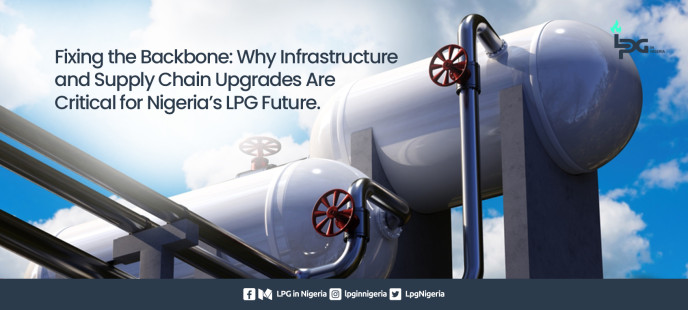- 2589
- 0
Sharing Ideas and Updates on LPG in Nigeria and related information to enable effective collaboration within the LPG Value Chain
Fixing The Backbone: Why Infrastructure And Supply Chain Upgrades Are Critical For Nigeria’s LPG Future.

As Nigeria works to deepen domestic LPG adoption, one of the most persistent roadblocks is weak infrastructure and a fragmented supply chain. From erratic supply schedules to high transport costs and poor storage capacity, these inefficiencies are strangling profitability and slowing the growth of the sector—especially for small and medium-scale operators.
This isn’t just a challenge for businesses; it’s a threat to national energy goals. If the LPG market is to truly scale and serve over 120 million households as clean cooking becomes mainstream, then infrastructure must catch up with ambition.
What’s the Problem?
During our discussions on the LPG in Nigeria WhatsApp platform, one recurrent frustration was the impact of logistics and supply chain bottlenecks:
“How much is profit? After removing running cost, what’s left?”
“I collect only 2 tons at a time because prices can change overnight. There’s no predictability.”
Let’s break down the root causes:
Depot congestion and limited regional access: Most LPG is distributed through a few congested coastal depots (Apapa, Port Harcourt, Warri). Operators in the North, Middle Belt, and hinterland towns pay significantly more due to long haulage routes.
Poor distribution coordination: Many retailers operate independently without shared logistics models, resulting in empty return trips and high delivery costs.
Inadequate storage: Smaller operators with limited storage can’t take advantage of low-price windows. They often buy in smaller quantities at premium rates.
Supply volatility: Frequent depot outages, forex-related import delays, and price changes at short notice destabilize planning and margin calculation.
Where Do We Go from Here? Strategic Solutions
To build a resilient, scalable LPG industry, we must fix the infrastructure and logistics gap. Here's how:
✅ 1. Decentralise Distribution Through Regional Terminals
The government and private investors must collaborate to build mini LPG depots and transloading terminals across Nigeria’s geopolitical zones—especially in the North-East, North-West, and rural South-East.
This would:
Shorten supply routes
Lower landing cost per kilogram
Decongest major depots
Enable faster response to local demand surges
Examples of such decentralisation can be drawn from India’s Pradhan Mantri Ujjwala Yojana (PMUY) model, which built rural distribution points across the country to ease last-mile access to LPG.
✅ 2. Support Local Storage Investment
Operators with only 2.5- to 5-tonne capacity cannot store enough LPG to survive price swings or supply gaps. We need more shared mini depots and cooperative refill clusters to help smaller players stabilize supply.
Some ideas include:
Community-owned storage facilities
Public-private partnerships for LPG cluster development
Group buying models to achieve economies of scale
✅ 3. Facilitate Access to Conversion Finance and Soft Loans
Many struggling LPG businesses were launched on personal savings, loans from family, or at high-interest rates. Without access to affordable capital, it’s hard to invest in proper logistics equipment (like bobtail trucks or metered dispensers) or increase storage.
We recommend:
Government-backed LPG infrastructure funds (like the MDGIF)
Micro-finance institutions offering low-interest loans for tank upgrades, skids, or cylinder stock
LPG Cooperative Schemes to raise joint capital for shared investments
The Impact of Inaction
Without these supply chain reforms, the Nigerian LPG sector risks:
Widening urban-rural LPG access inequality
More unsafe, unregulated plants popping up closer to end users
Price volatility that discourages household adoption
Loss of investor confidence in the industry
The Way Forward
At LPG in Nigeria, we advocate for data-driven policy and bottom-up infrastructure reform. We gather real-time price reports, listen to operator concerns, and highlight practical solutions for the government and stakeholders.
We believe that infrastructure is the invisible enabler of scale, safety, and sustainability. A well-oiled supply chain reduces cost, boosts profit, and ensures Nigerian households get clean cooking gas at a fair price.
Join the Conversation
Want to stay informed on LPG pricing trends, depot updates, and industry reforms? Follow LPG in Nigeria on WhatsApp, Facebook, and X (formerly Twitter). We’re creating a platform where knowledge meets strategy to drive the sector forward.
Let’s push for the infrastructure Nigeria’s LPG future deserves.
















0 Comment.